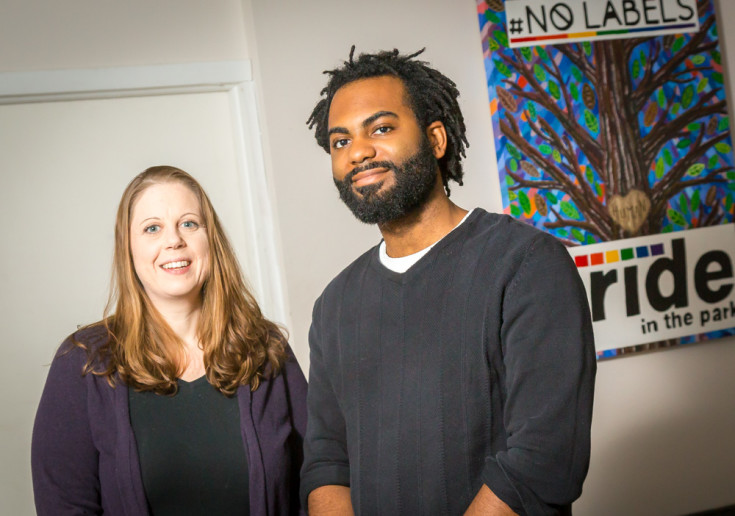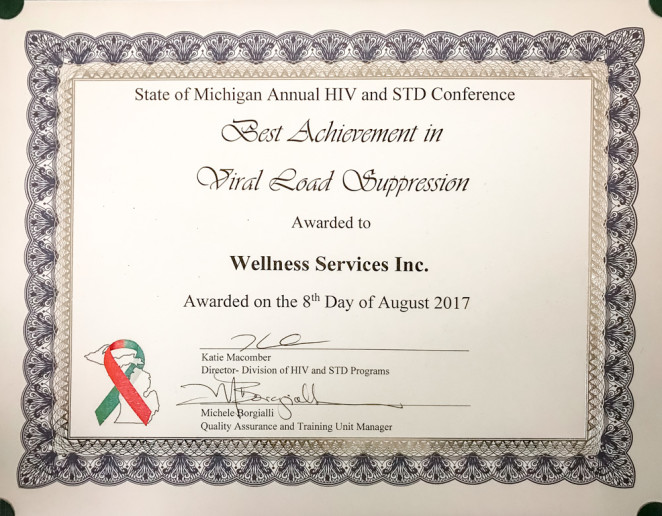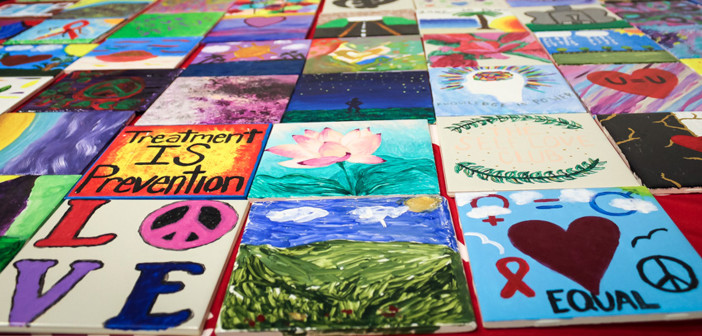On December 2, Wellness Services, Inc. celebrated their community art project “Peace by Piece” at the Greater Flint Arts Council with refreshments and music, and showcased a compilation of tiles painted by the community. Also at the event was a speaker who was HIV positive, to share his experiences, inspire the attendees, and raise awareness.
What is Wellness Services, Inc.?
Wellness Services, Inc., which serves six counties including Genesee, began serving the LGBT and HIV communities over 30 years ago, according to CEO Stevi Atkins. When Wellness Services began, it was in the boom and panic of the 1980s AIDS Epidemic. At that time, Atkins says, “our primary focus was to be a buddy for individuals who were homebound or had recently been diagnosed or were in the late stages of HIV, so they were looking for companions with some medical skills.” Because the medical community was not capable of effectively treating AIDS, they were mainly an end-of-life service so that those infected could pass with dignity. Atkins explains, “when this first hit, you had two to six months after diagnosis to live in rapid decline.” Founded by Jill C. Ramseyer, Genesee County Health Department nurse, the organization did what it could to meet the needs of, and ease suffering for the HIV-positive community.
Atkins remembers how their services have changed over the years since she began at Wellness Services, Inc. “As an intern, I was purging client files and there were boxes filled with manila folders holding just an intake form and an obituary,” she recalls. “Now, our client folders are in huge binders because people are living longer with the virus.” A large reason for the increased survival rates are HIV medications. It began with the controversial and highly toxic first HIV medication, AZT (azidothymidine), which made a difference but was expensive, difficult to obtain, and brought with it a slew of side effects. Atkins says, “as treatment became more sophisticated, we would see people whose CD4 levels (the white blood cells) were going up, and that was encouraging. That means the immune system is working, it’s responding. They were also having less Opportunistic Infections and those were some of the trademark symptoms that come along with HIV.” Common Opportunistic Infections include Kaposi sarcoma, Pneumocystis pneumonia and thrush. Atkins continues, “now there are pills that are a combination of several medications you can take once a day. And, they are working right now on a treatment that would require a once-monthly dosage.”
 But, the reason why Wellness Services, Inc. has community activities like Peace by Piece is because those who do not know that they are infected not only continue to spread the virus, but they are not receiving this life-saving treatment. According to HIV.gov, “more than 1.1 million people in the U.S. are living with HIV today, but 1 in 7 of them don’t know it.” Atkins believes part of the reason people aren’t getting tested is, “in general, there is a disconnect between people and HIV now. It is still a conversation that is not normalized in homes and that perpetuates a stigma about HIV.” Atkins explains that the youth are often very disconnected from the conversation about HIV because they weren’t alive during the AIDS crisis of the 80s. “The youth weren’t around to see the original impact of HIV and what it did to communities. That is something that we want youth to understand and we want them to have the information to understand the risk, and also have a conversation about consent.”
But, the reason why Wellness Services, Inc. has community activities like Peace by Piece is because those who do not know that they are infected not only continue to spread the virus, but they are not receiving this life-saving treatment. According to HIV.gov, “more than 1.1 million people in the U.S. are living with HIV today, but 1 in 7 of them don’t know it.” Atkins believes part of the reason people aren’t getting tested is, “in general, there is a disconnect between people and HIV now. It is still a conversation that is not normalized in homes and that perpetuates a stigma about HIV.” Atkins explains that the youth are often very disconnected from the conversation about HIV because they weren’t alive during the AIDS crisis of the 80s. “The youth weren’t around to see the original impact of HIV and what it did to communities. That is something that we want youth to understand and we want them to have the information to understand the risk, and also have a conversation about consent.”
Peace by Piece: Community Art Gallery
David Washington, 23, is the Prevention Specialist who headed the community art project. A recent UM-Flint graduate with a degree in graphic design and a minor in communication, joined Wellness Services because, “I wanted to explore how you can make an impact in your community through artwork. I wanted something more permanent in my life that I could make change through,” he says. Interested in “how art, community and activism intersected,” and to challenge himself in his new role, he took on the World AIDS Day project. Washington got to work, saying, “it was just utilizing every single connection we had as an organization to make it happen.”
When it ended, the Peace by Piece project had 67 tiles painted by Flint/Genesee Job Corps students, Wellness Services staff, and the public painting sessions at Flint Public Library. When Washington went out in the community for the tile painting, he says, “I told people that they could paint whatever they wanted. But, I wanted it to be their inner vision of a world free from stigma. We all face some sort of stigma, so I was trying to relate the stigma that people living with HIV face, to other oppressors and oppressions that we all try to navigate.”
Atkins adds, “I think this project speaks to how World AIDS Day should look. It’s the coming together of the community to talk about this thing and address it. David was spot-on with the messaging, connecting it to art and connecting that art to stigma.”
 Addressing the Opioid Problem
Addressing the Opioid Problem
Wellness Services, Inc. works to address all of the ways HIV infections are passed, including through using hypodermic needles. They have a syringe exchange program, and now, have recently added a program for Naloxone. Naloxone is used for the complete or partial reversal of opioid overdose. Atkins explains, “anyone who has an opioid prescription in the house can come to us, get trained on overdose response, and then get a kit from us to have on their person.” The results have been highly influential for Genesee County, Atkins states, “We’ve had 167 doses of Naloxone administered. So, that means 167 overdoses were stopped and lives were saved.”
Achieving Viral Suppression to Stop HIV Transmission
The organization recently received an achievement award for virally suppressed clients. A “virally suppressed” person is living with a very low level of HIV and is taking medications as prescribed, so that they can stay healthy and have effectively no risk of transmitting HIV to HIV-negative sexual partners. “We were within the top three in the state of Michigan,” Atkins explains. “Thinking about all of the barriers our clients in Flint face, with challenges like food insecurity and the water crisis, they were still able to work with our staff to focus on their health and become virally suppressed. And that speaks to the resiliency of people living with HIV. It is important to them to stay healthy and I think the more we treat our clients to show that we value them and they are a part in this, the more they stay engaged in care and stay on treatment,” Atkins explains.
David Washington believes in the power of the individual to make change. “One life touches so many others and we have power, as individuals, to make a change in their community,” he says. “It’s important for people to get tested and to take care of their sexual health the way they take care of any health issue. Take precautions, because prevention is the best treatment that we have. And also for people who believe in making a change in the community, any small action can help lead to a bigger impact.”
To learn more, volunteer or donate, visit wellnessaids.org/ and contact Yashica Ellis at 810.257.3131 or 810.232.0888.
According to HIV.gov, “more than 1.1 million people in the U.S. are living with HIV today, but 1 in 7 of them don’t know it.”
Photography By Eric Dutro








